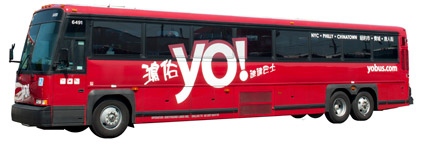BY LESLEY SUSSMAN | Community Board 3 has asked the city’s Department of Transportation to put the brakes on issuing any new permits for discount intercity bus services in certain sections of Chinatown where there is already a proliferation of such bus companies.
The nearly unanimous vote on the issue at the board’s Feb. 24 meeting was the culmination of months of discussion by C.B. 3 and its Transportation and Public Safety Subcommittee over what to do about the throng of cheap carriers that are creating congestion and other problems in the area.
The only dissent expressed came from board member Karlin Chan.
“There was no opportunity for bus operators and merchants to speak on the issue,” he said.
Chan also requested that the measure be sent back to committee because, he charged, there was “no quorum” when the committee made its recommendation.
Both of his objections were rebuffed by he fellow board members, who nixed the idea of returning the measure to the subcommittee for further discussion.
Transportation Subcommittee member David Crane also told Chan that, over the past recent months, operators of these bus companies had ample opportunities to present their side of the story.
“This issue has been discussed many times in our subcommittee,” Crane stated, prompting Chan to angrily walk out of the meeting before the vote was held.
Disgruntled local residents have long complained that the flood of cheap interstate buses has contributed to gridlock in sections of Chinatown where the bus companies are based.
As the board’s approved resolution puts it, “Curbside bus companies have proliferated within the Chinatown core and are contributing to street and sidewalk congestion, air pollution, litter and the obstruction of business entrances by queuing pedestrians.”
C.B. 3 said the areas where it wants D.O.T. to refrain from issuing any new permits for the curbside buses are East Broadway between Pike and Rutgers Sts.; Pike St. between Division St. and East Broadway; Division St. between Pike and Canal Sts.; and Allen St. between East Broadway and Hester St.
In other board business, C.B. 3 approved a resolution to “protect the health and safety of school children at P.S. 110,” located at 285 Delancey St.
The community board said better pedestrian safety measures were needed in the area around the Florence Nightingale School because there have been numerous cases in recent years in which students there have nearly been struck by cars.
The school is bounded by Delancey, Cannon, Broome and Lewis Sts. Cannon and Broome essentially act as service roads used by people parking cars on the streets and by maintenance crews at the Hillman Co-operative, a residential building adjacent to the school.
The resolution called for D.O.T. to “investigate the site” and meet with the school’s principal and its P.T.A. “to gain a better understanding of the use of the service roads by cars and pedestrians.”
DOT is also being asked to meet with representatives of the Hillman co-op.
In other business, the board overwhelmingly voted against an amendment to the City Charter that would have imposed 12-year term limits on community board members throughout the city.
In its resolution, the board said, “It takes a long time for members to acquire knowledge and expertise, so that they can play important roles in negotiating with developers, assisting constituents and tackling community problems related to traffic, sanitation, safety, business development and interests that impact all city residents.”
City Councilmember Daniel Dromm of Jackson Heights, Queens, introduced legislation in December that would limit the amount of time a board member could serve to six two-year terms. The legislation would only apply to board members appointed after April 1, 2016.
Dromm and other councilmembers have argued that the city has undergone a great deal of change in the past 30 years, and that this should be reflected in who sits on the community boards. Dromm said that when people remain on community boards for three and four decades, it creates a “huge power structure that doesn’t always benefit a changing community.”



































